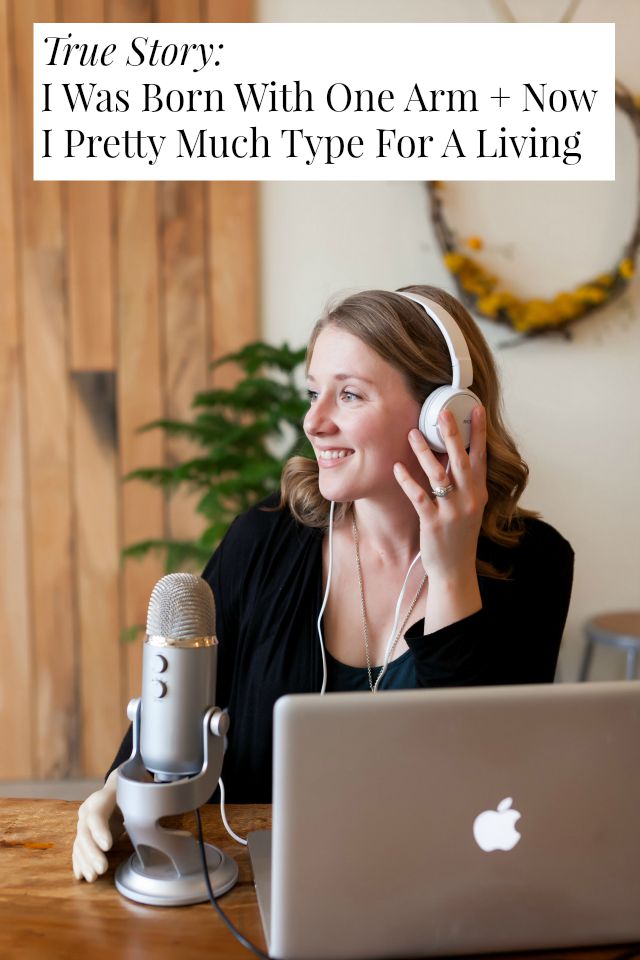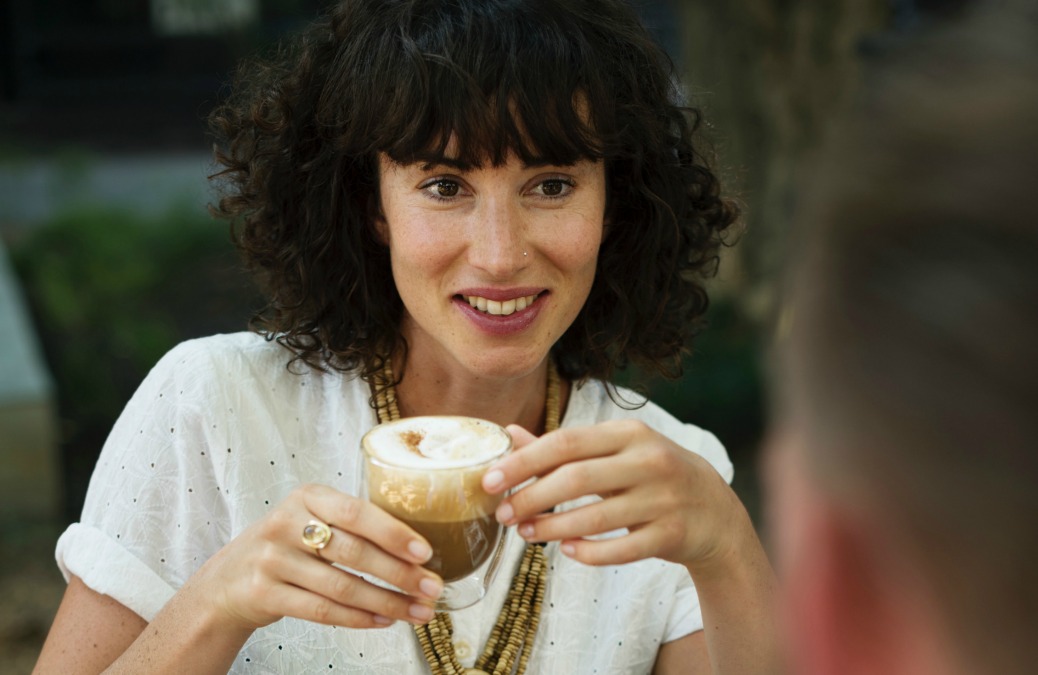Tell us a bit about yourself!
My name is Jennifer and I’m from Sacramento, California. I’m a 32-year-old writer, editor and podcast host and I like to spend most of my free time traveling, hiking and exploring my own city.
Does your doctor know why your right arm didn’t fully develop?
Not really. For years, my dad was convinced that his exposure to Agent Orange in the Vietnam War caused the deformity, but doctors have ruled that out. Other possible scenarios have been brought up, including the chance that something could have been wrapped around the arm in the womb to cause it to stop forming properly, but no one really knows.
Did your parents know about this before you were born? Or was it a surprise? How did they react?
It was definitely a surprise. Technology in the early 80’s wasn’t as great as the technology we have today and apparently there weren’t any red flags.
Here’s the story I’ve heard from my parents:
Because of my dad’s exposure to the chemicals used in the war, my parents went through genetic counseling before thinking about having children. They were told that there was a 1-2% chance that there might be an issue, but that it shouldn’t deter them from having children.
I was breech, so a c-section was scheduled and in the operating room that day, the doctor held me and looked at my dad and let him know there were some issues. My mom remembers being really nauseous because she was awake for the procedure, so they cleaned me off, wrapped me up and showed me to my mom. She remembers saying “Hi, Jennifer,” and then they put her under.
My dad was pretty upset, thinking that the 1-2% chance of potential issues had, in fact, occurred. Once my mom was in recovery and had a chance to wake up, my dad and the doctor sat down with her and gave her the news. Not only had I been born with a malformed right arm, I was also jaundiced and had hip dysplasia.
I can only imagine what my parents were going through. My dad was afraid that something he had been exposed to over 10 years prior caused this to happen and my mom was groggy from anesthesia and was a first time mother trying to figure it all out. They had just heard that I would be wearing hip braces for three months, the doctors wanted to keep me in the hospital for longer than normal and they now had to quickly get familiar with the world of prosthetics.
I’m positive that it was a rough road (I would also end up with colic, childhood asthma and need tubes in my ears, so you get the idea), but they really seemed to have a good support system in those early months.
Do you use a prosthesis?
I do! I was fitted for my first prosthesis as a toddler and learned by practicing a lot. I’d pinch my dad’s nose and try to grab random objects. As I got older, the prosthetics evolved. I also started going to Shriners Hospital for Children at a fairly young age. It was amazing how many doors that opened. I upgraded to an arm with a hook that allowed me to have a better grasp on everyday objects and swing from the monkey bars like the rest of the kids.
In high school, I switched over to a prosthesis that looked like a hand and that helped me in the self-esteem department a bit. I also played volleyball so I was fitted for an arm made specifically for sports.
Once I left the care of my doctors at Shriners (sadly, it’s not a hospital for adults!), I had to become my own advocate. I actually went back to the prosthetics doctor who made my very first arm and she’s now helping me work with my insurance to get me what I need.
I currently wear a prosthetic arm that looks like a hand for everyday use and I just recently added a new arm to the collection that helps simulate a wrist for things like yoga, push-ups and other exercises.
The options out there in the world of prosthetics are pretty incredible and my family has always told me, “you’ll never know unless you try.” They’re right!
Do you think this has affected other areas of your life?
Absolutely. I often have to gauge a situation when I’m meeting someone for the first time. Professionally, you’re expected to shake hands, but I’ve had people kind of freak out on me in the past. I’ve had business people swat my hand away, nearly choke on drinks, stumble over words and make semi-inappropriate jokes. (Seriously. I met a prominent chef once and he shook my hand, laughed and asked if I watched Arrested Development. It’s a good thing I have a sense of humor!)
I often feel bad because, let’s face it, how often do you look down at the hand you’re about to shake? No wonder most people are shocked! A lot of times I’ll shake with my left hand, but I’m always left with a less-than-great feeling—as though I’m being less authentic by doing so. To be honest, I feel like it actually benefits me to just go for it and shake with my right hand and risk the scene that might ensue. If nothing else, it’s a conversation starter.
Romantically, of course it’s been an issue! My husband and I met online and after our first date, it dawned on me that he didn’t notice my arm. I remember having to tell him over the phone. We still laugh about it over twelve years later.
The thing is, I rarely lead with it in conversation because I don’t want it to define me. I’m so much more than my disability and who wants to be known as “the girl with the arm,” right? I’ve had friends and bosses who didn’t know for months because I’ve done what I needed to do just as well as anyone who has both arms.
How do you deal with long-sleeved shirts?
This is a sensitive one for me because for a long time, I would wear long sleeves every day. I still do most of the time—even in the summer! I’ve always been incredibly self-conscious about my prosthesis because, no matter how real the hand looks, the part that connects to my body just isn’t all that attractive.
In recent years, I’ve been a bit better about letting some of those insecurities go. That said, it’s a constant battle with that inner voice that tells me my arm isn’t “pretty.”
How do you feel when people ask you about it? How would you prefer people behave?
This is a great question! I actually prefer when people ask questions—the more the better! While I definitely don’t make a point to center conversations around my arm or prosthetics, I really don’t mind talking about it. Common questions I receive include:
- Q) Does it hurt? A) Nope!
- Q) How did it happen? A) I was born this way. (Though I sometimes enjoy telling a tall tale just to get a laugh.)
- Q) Do you have fingers? A) Yes! Most people may not know this, but I do have 5 tiny fingers. Only three fingernails developed. And yes, I’ve painted them.
- Q) Have you always been left-handed? A) As far as I know, yes!
I think the biggest thing is that I want people to feel comfortable! A lot of the reactions I noted above resulted from someone being uncomfortable and perhaps a little shocked. It’s bound to happen, but asking questions and being politely curious is a far better response than rattling off movies or TV characters with references to prosthetics (read: Yes, I’ve heard that Captain Hook joke before—from all the mean kids on the playground growing up.)
These days, you’re a professional writer; you essentially type all day. How do you do it?
It’s true. I type using just my left hand. While there are prosthetic arms that could probably help me type with two hands, I’ve never had much use for them. I may not win any speed typing contests, but I get the job done (usually with time to spare). I do worry about carpal tunnel and a whole host of other issues that are creeping up on me as I get older. I actually have a physical therapy workout that I try to stay on top of as much as possible. I’ll always be asymmetrical, but I’m working hard to make sure it doesn’t cause issues for me down the road.
What’s one thing you’ve learned from this that any of us could apply to our daily lives?
We’ve all got something that trips us up from time to time, right? You just have to keep moving forward. I think the most important lesson is always make lemons into lemonade. I was thrown a few lemons at birth and some days still are really hard. I have to think about things that most others don’t. How am I going to open that door if my one good hand is full? How am I going to operate my new DSLR camera when I can’t reach the shutter button? How am I going to put my hair up in a ponytail once I’ve put my prosthesis on? Everything takes me a few extra steps or minutes and I’ll be the first to admit that the inefficiency of it all bums me out. However, I’ve done a lot of work to push beyond my comfort zone and I always seem to figure out how to make things work.
So there it is: make that lemonade and then ENJOY IT. Revel in your ability to turn a negative into a positive. Life is hard and I think celebrating the tenacity that keeps us thriving in spite of life’s difficulties is incredibly important.
Thanks so much for sharing your story, Jennifer! Do you guys have any questions for her?








I absolutely love this interview! Thanks for being so open, Jennifer.
Thank you for reading it, Helena!
that’s one of my favorite web site 🙂 thanks for the article
I just learned this week that I will have a granddaughter in a few months with part of her left arm missing. I am glad to see that you have had many successes and I hope my granddaughter will have the good self esteem that you do!
Tam, I’m so glad you found this interview! My grandparents were a HUGE part of my childhood (and adulthood, of course) and they definitely helped me understand that anything is possible—disability or no. It may not always be an easy road for your granddaughter, but being surrounded by supportive, encouraging adults is the key. Sending love to you and your family!